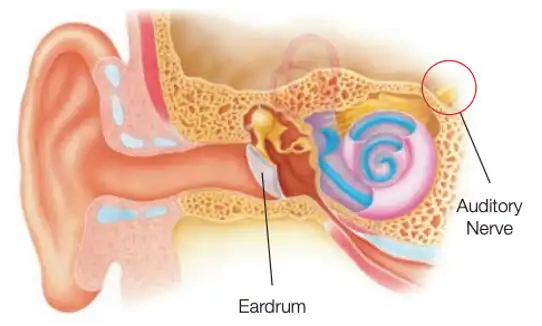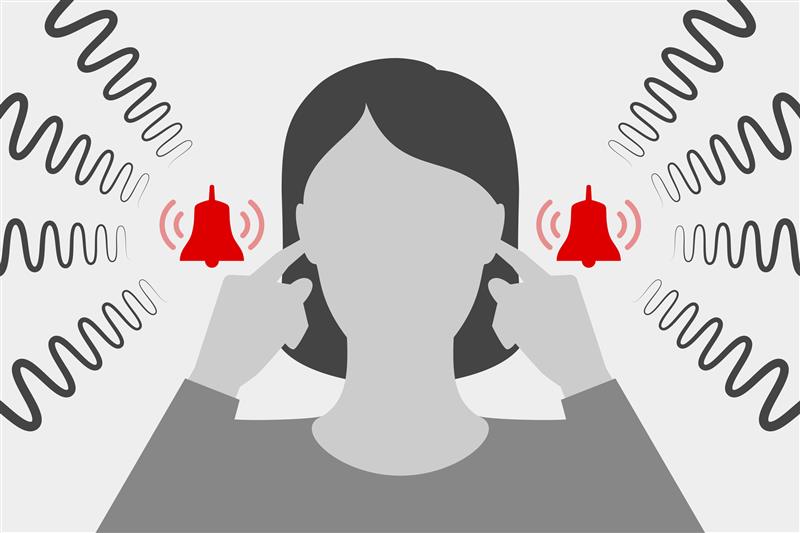May brings the promise of longer days and warmer nights, and something just as sunny—it’s Better Hearing Month! A time dedicated to raising awareness about hearing health, celebrating the strides made in audiology, and empowering individuals to prioritize their auditory well-being. As the flowers bloom and the world awakens from winter slumber, May offers a fresh reminder to tune into the wonderful sounds of summer.
Read MoreIn a bustling world filled with noises, from the gentle hum of traffic to the rhythmic tapping of keyboards, most of us barely notice the everyday sounds around us. However, for individuals with misophonia, these seemingly innocuous sounds can trigger intense emotional and physiological reactions, leading to significant distress and discomfort.
Read MoreResearchers have found that individuals with untreated hearing loss are at a significantly higher risk of developing dementia compared to those with normal hearing. In fact, studies suggest that the risk of dementia may increase by as much as fivefold in individuals with severe hearing impairment. What’s more, some studies have been beginning to show that hearing loss is the #1 risk factor for dementia. But how exactly does hearing loss lead to cognitive decline?
Read MoreIn recent years, the connection between hearing loss and dementia has presented itself in numerous ways to hearing care and healthcare professionals. While they may seem unrelated at first glance, research suggests a compelling relationship that points to the importance of addressing hearing health for overall cognitive well-being.
Read MoreOne of the most profound areas where hearing loss exerts its influence is in our relationships. Whether it’s with partners, family members, or friends, the ability to communicate effectively forms the foundation of healthy relationships. And more than being able to hear our loved-ones clearly, it’s just as important that our loved-ones know they are being heard. Relationships are a two-way street, after all, and when communication becomes strained due to hearing loss our loved-ones can be affected just as much as you!
Read MoreWhen it comes to protecting your hearing, a quick and painless hearing test performed once a year can make a world of difference. It’s easy to take our hearing for granted, but healthy hearing enriches our connection with others, our overall health, and our everyday lives. Below are five standout reasons to consider the benefits of an annual hearing test!
Read MoreThere must be love in the air, because lately I’ve found myself reflecting on the profound impact that hearing health has on our relationships. And whether romantic or not, this Valentine’s Day serves as a poignant reminder of the vital role that our sense of hearing plays in fostering these relationships, leading to meaningful connections with those we hold dear. So, in the spirit of Cupid and his heart-shaped arrows let’s show our ears some much-deserved love this Valentine’s Day!
Read MoreAn apple a day, more laughter, and…hearing aids? A recent study suggests that hearing aids can significantly impact your longevity, something that we at Beltone have seen firsthand over our 80 years in treating hearing loss. What’s more, most of the 40 million adults with hearing loss are not using hearing aids! Both the hearing and health benefits received from hearing aids are undeniable, and now a groundbreaking study is one step closer to proving it.
Read MoreWhile many of us await the holidays in eager anticipation, for some the festive season can be a time of increased isolation and loneliness, particularly for those dealing with untreated hearing loss. Forced isolation, coupled with the challenges of impaired hearing, can amplify feelings of frustration, and contribute to mental health issues. In this blog post, we’ll explore the connection between holiday depression, isolation, and hearing loss, and discuss strategies to break the silence and rediscover the joy of the season.
Read MoreMuch like learning a second language, or keeping your tennis stroke consistent, there are some things in life that need a bit more regular-use than others to stay in shape. We’ve all heard the phrase, “Use it or lose it!”, and when it comes to your hearing, that’s exactly what can happen when hearing loss is left unchecked.
This blog will detail a condition called Auditory Deprivation that can result from prolonged neglection of a hearing loss, and although we can’t help keep your forehand in play, we can certainly spare you from the negative impact this condition can have on your quality of life.
Read MoreThe holiday season is a time for joy, celebration, and gathering with loved ones. However, for those with hearing loss, these festive occasions can present unique challenges. In this blog post, we’ll explore some practical tips for handling holiday gatherings with hearing loss, ensuring you can fully participate in and enjoy every merry moment.
Read MoreHow loud is too loud?
Our everyday lives are full of noise, some of which has the ability to damage our hearing. And because our hearing is a depreciating-only asset, it’s incredibly important to protect and maintain what we’ve been given!
The volume of noise is measured in decibels (dB), and our ear anatomy begins to show signs of damage when exposed to sounds 85 dB or higher. To put this into perspective, average home noise such as cabinets closing, footsteps, background TV or music, etc., all live within the 40 – 60 dB range. When you head outside to mow your lawn, your lawn mower can reach decibels within a range of 80 – 89 dB!
Read MoreLike any new thing, be it a phone, pair of shoes, or even a haircut, it takes some getting used to. Everyone in your circle may say, “Wow! Your hair looks great!” over and over (and it may even be true!), but it can take some time for you to catch up.
When it comes to new hearing aids, this sensation is completely normal and even made easier by the fact that you will be hearing your world in a whole new way! While some get used to their hearing aids on day one, others need a short period of adjustment, so patience is key. And with hearing loss recently connected to Alzheimer’s, there’s never been a better time to explore hearing loss treatment.
Read MoreHearing aids have revolutionized the lives of millions of people with hearing impairments, enabling them to experience the world in all its vibrant sounds. However, these delicate devices require proper care and maintenance, especially when exposed to challenging environmental conditions like heat and humidity. In this blog post, we will explore the impact of heat and humidity on hearing aids and discover some effective solutions, including the use of products like Perfect Clean, to ensure your hearing aids stay in excellent condition and provide you with clear, consistent sound!
The Impact of Heat and Humidity on Hearing Aids
Heat and humidity can significantly affect the performance and longevity of hearing aids. Excessive moisture can damage the delicate electronic components inside the device, leading to malfunctions or complete failure. “I regularly see patients come in because their hearing aids are not working properly, and we simply have to let them dry out because the humidity and moisture has collected inside.”
Read MoreAre you or a loved one hearing ringing, buzzing, whooshing, or other sounds in your ears or head that nobody else can hear? If so, you’re not alone. You may be experiencing tinnitus, a condition that affects over 25 million adults in the United States.
Tinnitus is the perception of sound when there is no external noise present. While it’s commonly referred to as “ringing in the ears,” tinnitus can manifest in various ways, including buzzing, hissing, whistling, swooshing, and clicking sounds. In rare cases, people with tinnitus may even hear music. It can be a temporary or ongoing condition, classified as acute or chronic.
Read MoreIt can be concerning when noticeable changes in your hearing start to creep in. And shopping for hearing aids can feel like a big step, perhaps accounting for the average 6 year wait period for hearing loss patients to finally seek treatment.
Fortunately, this somewhat bleak picture is changing overnight with the FDA approval of OTC hearing devices that can be sold directly to consumers online and in stores. This legislation brings hope and help to the 48 million American experiencing some degree of hearing loss, and will ideally make their individual journeys to treatment more expeditious, more convenient, and more affordable.
Read MoreThe brain serves as the central command center for our bodies, processing input from all our senses and swiftly making decisions to ensure our engagement with the environment, as well as our safety. Ongoing research continues to shed light on the profound effects of sensory loss on overall brain function. Namely, the effects of hearing loss and how it can alter social behavior, mental wellbeing, and overall quality of life. If you’re thinking, ‘Oh boy, one more thing to worry about!’, we’re here to tell you that hearing loss can be easily treated and is nothing to worry about with the right information. So, let’s start by looking at how hearing loss can affect your brain, and more importantly, how you can prevent these unwelcome affects:
Read More
It can be concerning when noticeable changes in your hearing start to creep in. And shopping for hearing aids can feel like a big step, perhaps accounting for the average 6 year wait period for hearing loss patients to finally seek treatment.
Fortunately, this somewhat bleak picture is changing overnight with the FDA approval of OTC hearing devices that can be sold directly to consumers online and in stores. This legislation brings hope and help to the 48 million American experiencing some degree of hearing loss, and will ideally make their individual journeys to treatment more expeditious, more convenient, and more affordable.
So below, we’ve handpicked five of our favorite options that are currently FDA registered to get you on the healthy hearing track:
Beltone Recognized as One of America’s Best Midsize Employers by Forbes, with Senior VP of Sales Douglas Kay.

Senior VP of Sales – Douglas Kay
With over 82 years of patient-led service, Beltone earns well-deserved recognition as one of America’s Best Midsize Employers for 2023 by Forbes! Beltone has grown exceptionally since their founding in 1940 by Sam and Faye Posen, but the dedication to award-winning hearing care has remained the same.
Read MoreThe market for OTC (over the counter) hearing aids is already producing a variety of highly capable devices. And if you happen to be experiencing mild levels of hearing loss, it has never been easier to find a potential out-of-the-box solution. We’d like to feature one of our favorite picks from the growing list of OTC offerings, and highlight some of the features that make these hearing aids stand out above the rest.
Read MoreWith OTC hearing aid options beginning to hit the market, it’s never been easier to shop for a variety of hearing treatments. And while some of the OTC products available are highly capable devices, I cannot stress enough the importance of getting a professional evaluation before purchasing hearing aids of any kind. In an honest attempt to demonstrate this, I’ll discuss below how sometimes it’s expensive to be cheap.
Read MoreMA, CCC-A
As recently as October of 2022, the FDA released official guidelines for bringing over-the-counter (OTC) hearing aids directly to consumers. And while this is a hopeful step for the 30 million Americans suffering from some degree of hearing loss, more options invariably mean more to think about when it comes time to decide what is best for you and your hearing. But not to worry, because below I will highlight the most important things to consider when comparing OTC with prescription hearing aids, hopefully nudging you one step closer to healthy hearing.
Read More




















